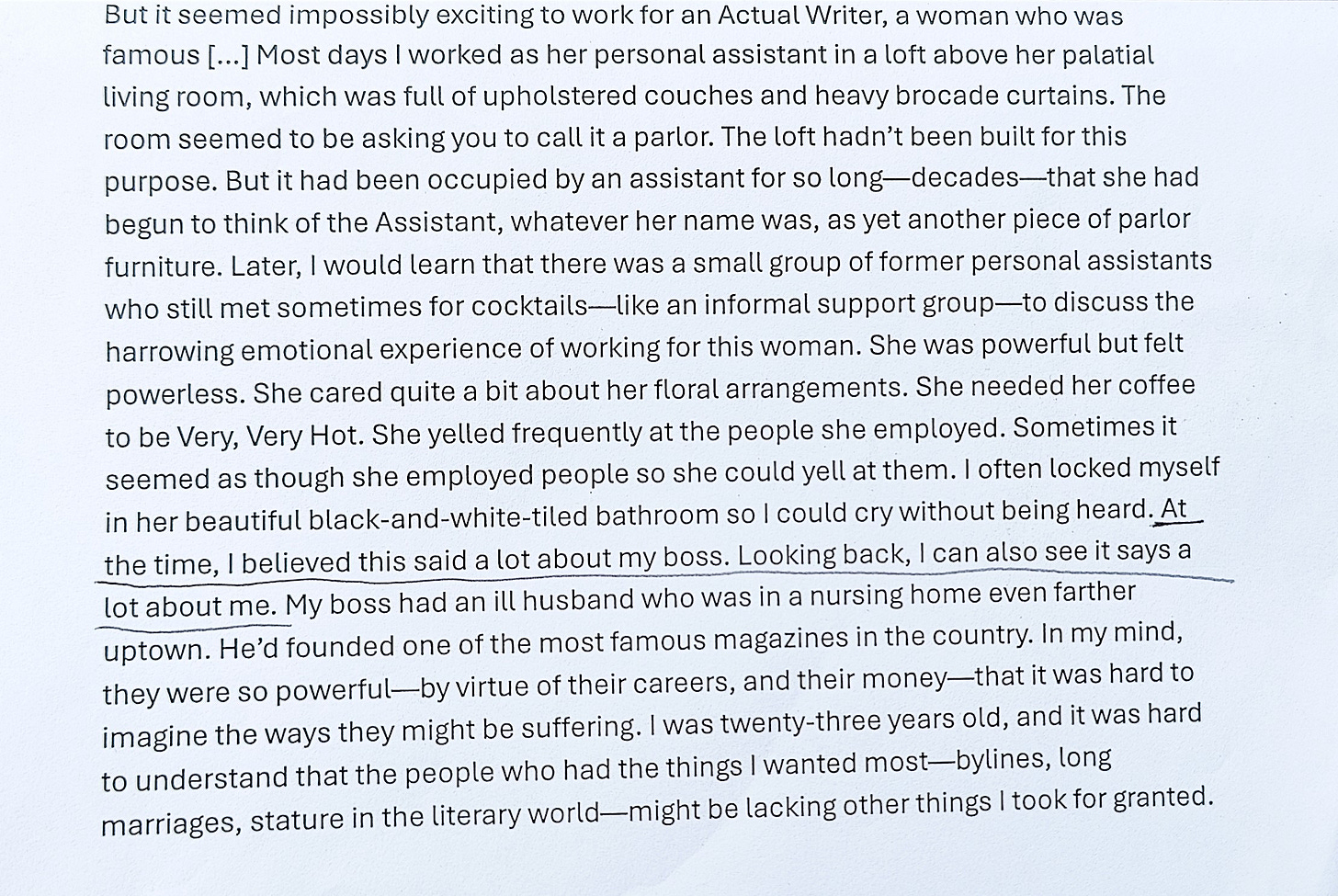How will The Chain actually work?
Like your fav English teacher always did, I give you a worked example (PLUS sharing the writer who's kicking the whole thing off on July 6th)
Hi friends,
There’s a folder on my computer called Short Writing Bits where I save said short writing bits. It’s full of obscurely-titled pieces that I think I might want to go back to and finish / redraft / find a home for at some point.
It didn’t take me long to find the wee something I’d written on retreat last autumn under conditions that best approximate those that writers in The Chain will face in a few weeks’ time. I thought I’d share both the piece that prompted the writing and my own fragment to give you a flavour of what being in The Chain might feel like.
Just as we’ll do each week, I’d been in a tutorial where we read and discussed various aspects of the prompt piece before taking ourselves off to write. I typed my response straight into a blank Word document in a 40 minute burst and what I share below the photo of the Leslie Jamison piece (an extract from The Assistant’s Loft from the anthology “Goodbye to All That: Writers on Loving and Leaving New York” edited by
) has just been copied and pasted from that document. No edits. No additions.Of course, writers whose first draft is selected as the following week’s prompt piece will benefit from an edit from me and extra time to polish up their piece before it goes out the following Sunday. I haven’t bothered since I’m leaning — as we all will — into imperfection :)
Tang
Dr Tang’s surgery was at the bottom of one of my neighbourhood’s steep hills, named The Drives. It was tucked in at the far end of an austere, flat-fronted Victorian terrace set back from the main road by a crumbling brick wall and scrubland that the council sometimes managed, mostly didn’t. The conservation area stopped a few streets back. Down at the bottom end, no one was going to report you for putting in the wrong windows or drilling a handrail into the sandstone.
Inside was pure 1980s. The wood panelling of the entrance and waiting room a syrupy orange. The embossed wallpaper above it might once have been pastel or multicoloured but was, by the mid 2000s, a smoke-stained magnolia. Not that anyone was smoking in the doctor’s waiting room by that point.
In my mid-twenties, I spent more time than I should have sitting on the brown fake leather bench that ran the length of that waiting room as I listened for his scratchy voice calling for me over the tannoy system. I’d look through the receptionist’s hatch at the rows of box files containing his patients’ medical records, wondering whether my file bulged in comparison to the others in the I-K box. The only GP in the practice, he was known for being sharp. Local friends, when we spoke about him over glasses of wine on Friday nights, would call him cold. Detached. Offhand. He was much-mythologised and we referred to him dismissively by his surname only.
I often fretted over whether I’d catch my name as it was called. Mishear it. I worried that if I didn’t get up quickly enough and climb the stairs to his room that he’d grow impatient and call for someone else. It never occurred to me that he might come to the waiting room in person to fetch one of his patients. All of this to say that my anxiety then was febrile. It wasn’t bound to the symptoms that had prompted the appointment but rippled far and wide, even to whether or not I’d be seen.
There was always a static sound before a name was called. I listened intently for it. Imagined I was hearing it even when I wasn’t, which led to yet more concern this time about my hearing, about my brain. In this way, my symptoms in those days were often rapid-onset. Always the sign of something grave. In need of immediate attention.
I always knocked even though he was expecting me. He didn’t stand to greet his patients, just lifted his top hand briefly from where it sat across the other in his lap to gesture one should sit. I’d mimic this posture of his. Outline the current problem giving as much detail as I could. Using as much medical terminology as the internet had provided me with.
Why doesn’t he have any urgency about him at all? I’d think. Can’t he see how serious this is? At the time, I believed that said a lot about my doctor. Looking back I can also see it says a lot about me.
What next?
My response above is unfinished, and actually that’s the point. It’s just the beginning of a scene. A wee something I’m wafting under your nose to evoke a feeling; a thought.
Maybe you’ll read the Jamison prompt piece above and have a go yourself? Maybe you’ll choose to underline a different sentence to kick start your writing, or consider a relationship where there was a power imbalance. Maybe you'll write a pen portrait of someone impactful from your youth you see differently from the reflective stance of the “now” version of you. Give it a go and let me know how you get on.
Exciting Announcement!
The Chain kicks off on Sunday 6th July with a piece written especially for us by
whose brand new book, Unschooled, is available to pre-order right now.Caro is back on Substack with a bang this week, so please do go and read her words and subscribe if she’s new to you.
Lindsay x












Loved this prompt Lindsay! I read your post first thing and came up blank on any ideas sparked by the idea of a relationship with a power imbalance. Then went away for a cuppa and inspiration struck and now I have 600 words about my first ballet teacher when I was 6-8 ish.
I can so clearly see both of those rooms in my mind as I read these pieces, thank you for sharing it with us 😊 looking forward to seeing what bubbles to the surface when I sit down to write ✍️